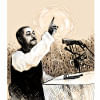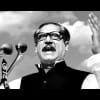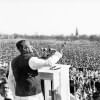Bangabandhu's March 7 speech: A linguistic marvel
Bangabandhu Sheikh Mujibur Rahman is regarded as the undisputed leader of the independence movement, the main architect of Bangladesh. Thanks to his heroic leadership and unwavering efforts, the nation was born, and history epitomises his messianic identity by acknowledging him the rightful Father of the Nation. Today, we come together to commemorate and celebrate the life and legacy of Bangabandhu. As we honour him, we also honour the nation he loved and tirelessly worked for.
Nonetheless, is it enough to simply acknowledge his contributions to our nation, or to remember the important dates from his life? To truly comprehend the greatness of Bangabandhu, we must delve into his speeches, which were the cornerstone of his persona.
Bangabandhu Sheikh Mujibur Rahman was an exceptional orator, whose words enthused and moved countless Bangalees and people beyond Bangladesh. Unesco's recognition of the March 7, 1971 speech as one of the world's most important documentary heritage adds validity to this claim. The speech, which continues to resonate to date and serves as a reminder of Bangabandhu's leadership and charisma, has also been featured in the book We Shall Fight on the Beaches: The Speeches That Inspired History by Jacob F Field (2014) as one of the most influential and significant political speeches of the last century.
So, what makes the March 7 speech unique? There has been a plethora of talks and discussions about the politico-historical significance of the speech. Yet, less focus has been put on its linguistic artistry. This article is a modest attempt to this end.
The interplay between language and politics is well-established. The great minds, from Plato and Aristotle to contemporary scholars, have studied and still study the connection through multidisciplinary lenses of communication, critical discourse analysis (CDA), positive discourse analysis (PDA), and peace linguistics (PL). These scholarships offer a testament to the fact that political discourses play a crucial role in shaping our society during conflict. In the same vein, by scholastically delving into Bangabandhu's speeches, we can gain a profound understanding of his aspirations and visions.
Bangabandhu, as a fluent and extempore bricoleur, largely followed the classical organisation of a rhetoric speech in the March 7 speech, however, with some liberties. As such, the three elements of persuasive political speech—namely ethos, pathos, and logos—are evident in the speech. Additionally, an adept adoption of a dialogic pattern was present in the speech. In so doing, the speech used mood block (75 declarative, 13 imperative, and six interrogative clauses), modals (modal auxiliary verbs, such as "may," "must," "should," "can," "will," etc), and different modes of tense (31 percent present tense, 41 percent past, and 28 percent future tense) to represent Bangabandhu's leadership skills and rightful demands. The overall structure and impact of his speech, thus, make it a positive emancipatory discourse embedded in resilience, optimism, positivity, encouragement, and determination.
Bangabandhu embodied the essence of ethos: a positive self-notion in the name of authority, reliability in telling the truth, and gaining trust as a leader to establish his ideological credentials. For instance, his articulation to address the countrymen in an emphatic way ("my brothers") included all ethnicities, religions, and professions. Such a notion plunges the audience immediately into the midst of hope and carries them along on the flow of assurance and actions. Additionally, the original Bangla speech displays a ubiquitous use of personal pronouns, particularly, "I" (23 percent), "we" (23 percent), "my"/"mine" (19 percent), and "our" (16 percent). This rhetoric strategy is a marker of similitude which brought Bangabandhu and his audiences closer, fostering ingratiation and solidarity to resist injustice and aspire for the nation's liberty.
Next, pathos, an affective dimension of rhetoric, is evident in the March 7 speech. Through his passionate delivery, Bangabandhu asserted his unwavering commitment to secure liberty, justice, and peace for his people. His speech echoed a tone of hope and unity in the face of adversity. By identifying Pakistani colonialism as the conspiratorial enemy, Bangabandhu galvanised his audience by creating a powerful discourse of resistance and emancipation. The emotional intensity of the speech was palpable, evoking a strong sense of empathy from the audience. With his speech, he gave a voice to the oppressed and inspired a sense of solidarity that resonates to date.
The most powerful use of pathos in the speech came with the last two statements. These statements, on one hand, ignited the emotions of the public who had endured oppression for 23 long years, and on the other, served as a powerful declaration of independence for Bangladesh. The catchphrase in Bangabandhu's last two lines provided the mantra to unshackle Bangalees from their long-standing struggles and sufferings: "The struggle this time is the struggle for our emancipation. The struggle this time is the struggle for our independence."
Finally, Bangabandhu incorporated logos, the third essential element in persuasive speech, by employing historical events, reasoning, argumentative discourse, and critical cognition. His logic and stance, informed by facts and arguments, portrayed him as a fearless leader standing against injustice and oppression; one advocating for humanity and freedom. For example, Bangabandhu effectively utilised the first seven paragraphs of his speech to substantiate his argument, support his reasoning, and persuade his audience to collectively consent to the declaration of independence: "We gave blood in 1952. After winning the election in 1954, we couldn't even form the government. Proclaiming martial law in 1958, Ayub Khan made us slaves for ten years. During the 'Six Point Movement', my children were gunned down on 7th June 1966. After, the fall of Ayub Khan brought about the 'Mass Movement' of 1969 where Yahya Khan usurped power. He said he would give constitution and democracy to the nation. We Agreed. Thereafter the rest is history."
And now the world knows the new history. The supremacy of this 15-minute speech is that Bangabandhu called for independence and the Bangalees responded to the call.
Today, any discussion on the incredible journey of Bangladesh is incomplete without the mention of Bangabandhu. His contributions serve as a reminder of how visionary leadership can transform a nation's destiny. However, to fully illuminate the essence of Bangabandhu's vision, and appreciate his impact, it is imperative to study and understand his speeches more rigorously. In doing so, let us aid in strengthening the foundation for a better tomorrow for Bangladesh. Let us not simply remember Bangabandhu on certain dates, but actively strive to honour his legacy by emulating his leadership and fulfilling the vision of Shonar Bangla.
This op-ed was developed following the author's original research work on CDA of the March 7 speech (published) and PDA of the UNGA speech (under review) of Bangabandhu Sheikh Mujibur Rahman.
Dr Shakila Nur teaches at the Department of English and Modern Languages, North South University.
Views expressed in this article are the authors' own.
Follow The Daily Star Opinion on Facebook for the latest opinions, commentaries and analyses by experts and professionals. To contribute your article or letter to The Daily Star Opinion, see our guidelines for submission.


 For all latest news, follow The Daily Star's Google News channel.
For all latest news, follow The Daily Star's Google News channel. 













Comments